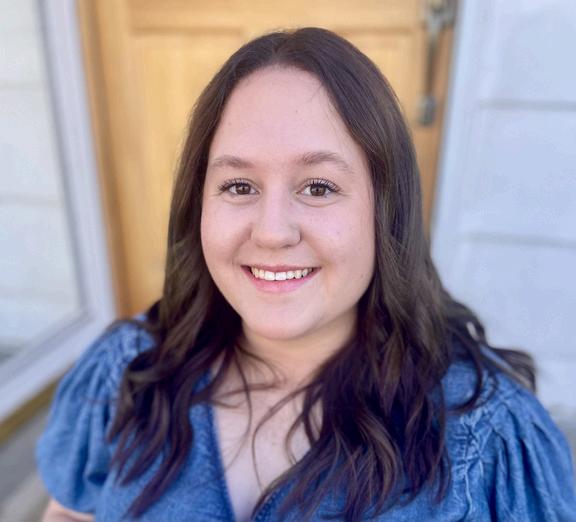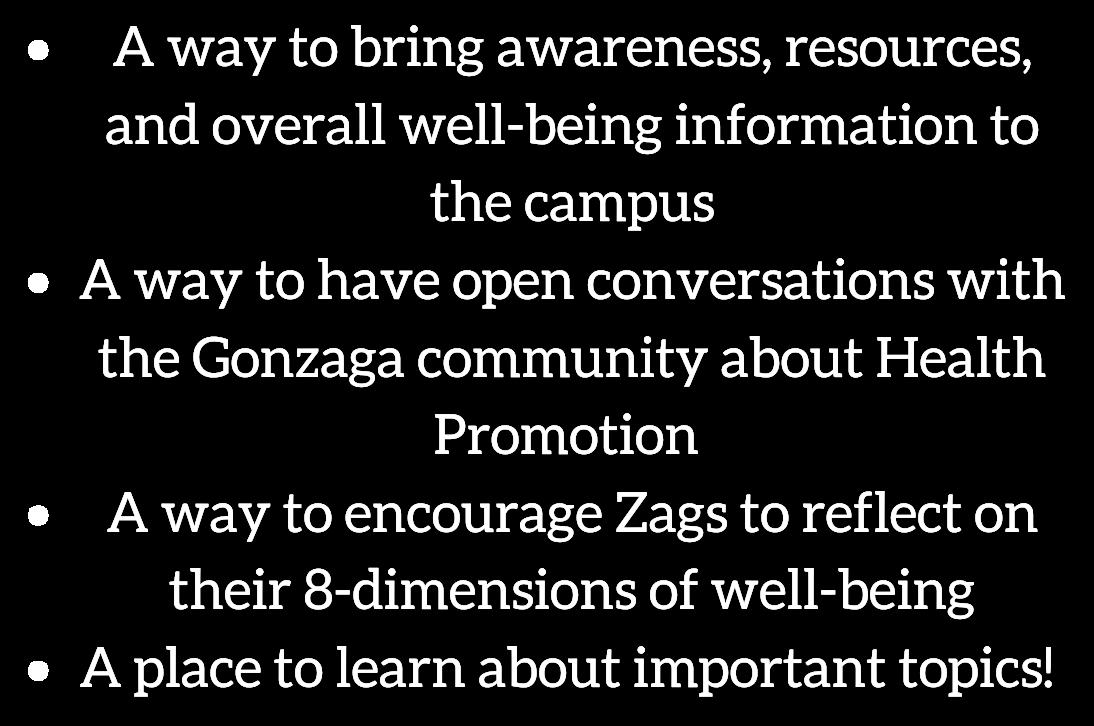

STATE 2024 of the Undergraduate CLASS


2024 State of the Undergraduate Class
- Introduction -
Welcome! This document shares some of the information that was gathered in the Spring 2024 Wellbeing Survey. There were approximately 1,600 student responses from undergraduates at Gonzaga. The survey asked about General Well-being, Basic Needs, Mental Health and Well-being, and Substance Use. The information is not meant to indicate or predict exactly what students will encounter this academic year.
We invite you to spend some time reviewing the additional resources. Thank you to all of our community members. No matter who you are, you play a vital role in supporting student well-being and success.
The Office of Health Promotion (OHP) fosters student well-being through proactive, non-judgmental, and inclusive public health principles and practices. We provide resources about mental and emotional well-being, substance use, and healthy relationships.


Dr. Charmayne Adams, Kimberly Stanfield, PhD, NCC, LMHC MSHCA Assistant Dean Health Educator, Substance Use

Kylie Pybus, MPH Emily Albert, MPH Director, Health Educator, Office of Health Promotion Wellbeing



All results of the Spring 2024 Wellbeing Survey can be accessed through Power BI by visiting the Student Affairs Canvas page. Please scroll down to the Office of Health Promotion.
Fall 2023 GU Undergrad Demographics
Racial and Ethnic Makeup:
Religious/Faith Traditions Represented:
First Generation Students: 14%
General Well-being General Well-being
The Office of Health Promotion (OHP)’s goal is that all students at Gonzaga feel supported and can recognize their needs, exercise agency, and cultivate behaviors that contribute to sustainable, lifelong well-being.
The majority of students who completed the Well-being survey reported having a support system and a feeling of belonging.
Students agree that staff and Students agree that staff and ffaculty aculty prioritize prioritize ttheir heir health and health and well-being well-being
S Students tudents have a support system have a support system tto o turn to during stressful times turn to during stressful times
S Students feel that they tudents feel that they belong belong at at Gonzaga. Gonzaga.
Gonzaga Campus Pantry
Basic Needs Basic Needs
Mental Health and Well-being Mental Health and Well-being
Gonzaga students know the steps to take to improve their health and well-being in the following areas:
Student were asked how often they experienced the following mental health concerns with the last two weeks.
Experienced academic burnout
Feeling anxious, nervous, or on edge
Feeling depressed
Feeling isolated from others
There is a direct correlation between S

ONE-THIRD &
ONE-FIFTH
of GU students said anxiety of GU students said depression impacted academics Resources:
Stress management tips for students can be accessed on the Wellness Toolbox or through a consultation with OHP. Please also share page 9 of this report with your students for upcoming events that OHP’s Peer Health Educators are leading on campus.
The Center for Student Academic Success (CSAS) provides students with several resources on advising, academic support, learning assitance, and holistic development. They can be reached at: learningstrategies@gonzaga.edu advise@gonzaga.edu disability@gonzaga.edu
Mental Health and Wellbeing: Mental Health and Wellbeing: Suicide Prevention Awareness Suicide Prevention Awareness
Students were asked, on how many days over the last two weeks have they experienced thoughts about self-harm or suicide:
of Gonzaga students had thoughts of suicide or self harm (205 of 1,471).
Of those students, 4% (47 of 1,471) had these thoughts for 8-14 days.
of Americans have been affected by suicide in some way. 14% 54%
Resources:
Attending Mental Health First Aid can help you develop appropriate bystander intervention strategies. There will be upcoming First Aid trainings offered in January 2025.
If you are concerned about a student, please go to gonzaga.edu/sos or call CSPS at x2222.
Notes:
Suicide is the second leading cause of death for young adults.
Self-harm does not always indicate that a student is having suicidal thoughts. If you notice a change in behavior, the best thing that you can do is to ask directly.
The most witnessed forms of self-harm at Gonzaga are: Unhealthy alcohol/drug use
Eating too much/too little Intentional unhealthy relationships
Substance Use Substance Use
Students were asked during their time at Gonzaga, which of the
Alcoholicbeverages
Hallucinogens
Prescriptions-nonmedicaluseonly
Substance Potential Risks and Effects
Alcohol
Cannabis
Tobacco/Vape
Alcohol is the most widely used drug on college campuses and is associated with the highest incidence of overdose on college campuses. However, it’s important to note that many students choose not to drink for personal, religious, or cultural reasons (WA Young Adult Health Survey).
Cannabis use can negatively affect academic outcomes in college students, with students being more likely to drop out of college, have a lower grade point average, and miss more classes than students who do not use cannabis (Fontana et al 2022)
Tobacco products contain nicotine, which is habit forming and can harm young adults’ developing brain. E-cigarettes/vape pens, contain a mix of potentially harmful chemicals that are not safe to breath. Most e-cigarettes also contain nicotine (smokefreeteen.gov).
Hallucinogens
Prescriptionsnonmedical use
Hallucinogens include drugs such as MDMA, LSD, mushrooms, etc. Some risks of use include side effects such as dizziness, weakness, nausea, and drowsiness, having illusions and hallucinations, and other negative psychological effects.
Some students take stimulants like Adderall and Ritalin without a prescription as “study drugs”; risks of illicit stimulant use include depression and irritability, nervousness, nausea, withdrawal, potential overdose, and other effects. Students may also take opiods without a prescription, there are resources on fentanyl education and access to naloxone across campus.
OUR House is a community of students connecting through similar experiences and efforts to stop or reduce their use of substances or other potentially harmful behaviors. We welcome students exploring both sobriety or reduced use.
OUR House hosts weekly drop-in hours. These are for students curious about recovery or harm reduction to ask questions, get support and build community.
Mondays from 12:00pm to 2:00pm
Fridays from 10:00am to 12:00pm
We also host weekly all-recovery meetings where students come together to talk about what’s going on in their lives and anything else that might benefit their recovery.
Mondays from 3:00pm to 4:00 pm
Thursdays from 4:30pm to 5:30pm


resources & events

October 30th @ 3:00 - 6:00 PM
Theme: Substance Use
Location: Hemmingson Center
November 14th @ 3:00 - 6:00 PM
Theme: Body Image
Location: Hemmingson Center
December 9th @ 10:00 AM - 4:00 PM
Theme: Finals Care Package
Location: Hemmingson Center
HEALTH HUTS ARE...




Self-Care Tips
WELLNESS WORKSHOP DATES
October 29th @ 12:00 - 1:00 PM
Activity: Financial Wellness Workshop: Master Your Money
Location: Crosby Center, CPD Seminar Room
November 6th @ 9:00 - 11:00 AM
Activity: Post-Elections Pastries & Self-Care
Location: Office of Health Promotion (2nd Floor of Crosby)
November 20th @ 2:00 - 5:00 PM
Activity: Herbal Sachet/Essential Oil Roller Making
Location: Office of Health Promotion (2nd Floor of Crosby)
Resources for Students
StudentLinc code: zagsupport
Wellness Toolbox
Our Unique Recovery (OUR) House
Center for Cura Personalis
Health and Counseling Services
Resolution Center for Student Conflict and Conduct
Center for Student Academic Success
FACULTY AND STAFF WEBPAGE
CENTER FOR TEACHING AND ADVISING
SUPPORTLINC (through GU's Employee Assistance Program - username: gonzaga)
OFFICE OF DIVERSITY, EQUITY AND INCLUSION
Student Outreach and Support (SOS)
Office of Inclusive Excellence - Title IX
please contact ohp@gonzaga.edu for data inquiries
2024 State of the Undergraduate Class


